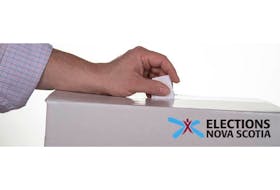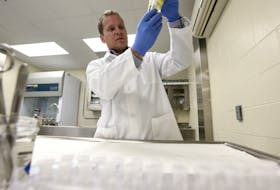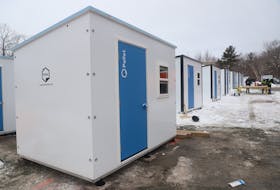It’s all about saving lives.
Nova Scotia’s Opioid Use and Overdose Framework has been in place for a year, and an event was held at the Northern Healthy Connections Society offices in Truro, on Friday, to provide an update.
Health and Wellness Minister Randy Delorey noted that take-home naloxone kits are now available in 285 pharmacies across Nova Scotia, and wait lists for opioid addiction treatment are much shorter- with some areas able to provide treatment right away.
“What we’re seeing is, even with all of the work in various jurisdictions you’re still seeing major increases in the number of deaths in many parts of the county,” Delorey said.
“We’re seeing the benefit of these investments here in Nova Scotia. With just the take-home naloxone kit we’re distributing through our community pharmacies…at least 90 that we’re aware of have used this to prevent and reverse overdoses.”
Truro Police Chief Dave MacNeil knows how valuable the kits can be.
“We have a great partnership with the department of justice who, just in the last year and a half, provided naloxone for all front-line police officers and corrections workers in the province,” he said. “We actually used a kit here one time in Truro to reverse an overdose and, no doubt, saved someone’s life.”
Dr. Sam Hickcox, a family doctor and addictions specialist, told the story on one person who battled opioid addiction.
Emily grew up in household where a family member physically abused her and her mother battled with alcohol addiction. She became addicted to opioids and, after her family doctor refused to see her because of her repeated attempts to get prescriptions for opioids, she moved to Halifax and began working in the sex trade.
“She learned of our opioid treatment program in Dartmouth and began methadone therapy,” said Hickcox. “She reports that the staff at our clinic were the first health care professional sto view her as a person rather than a problem.”
There were problems with Emily missing appointments and yelling at staff, but over time she adjusted and was given counselling to deal with childhood trauma.
“After two years in the program she has now stopped using illicit drugs, reconnected with some of her family members, stopped working in the sex trade, has acquired stable housing and is enrolled at a local community college,” said Hickcox.
“We know the vast majority of individuals who experience problems with opioid misuse and addiction have experienced trauma and violence at some point in their lives. We know that health care organizations are more likely to succeed in treating such individuals if they maintain awareness of this and offer a treatment environment that fosters safety, trustworthiness, choice, collaboration, and focuses on our patient’s strengths and resilience.”
Dr. Robert Strang, chief medical officer of health for Nova Scotia, said contaminated street drugs are a big problem.
“Synthetic and illegally produced opioids like fentanyl and carfentanil entering the street drug scene are a very real and serious and deadly issue. That is predominantly what is causing deaths in western Canada, but now more and more in Ontario, and we do have some appearance of those synthetic opioids and a few deaths in Nova Scotia.”
He said prescription opioids, when used with other prescription drugs or street drugs, are also putting people at risk.
“We have a stable overdose death rate. It’s higher than we’d like but it’s not increasing. I think that can be contributed to many of the things we’ve put in place during the last year/year and a half.”
Long term funding for harm reduction was provided to Mainline Needle Exchange, Halifax; Northern Healthy Connections Society (NHCS), Truro; and Sharp Advice Needle Exchange/Ally Centre, Sydney.
Al McNutt, director of the Northern Healthy Connections Society, said this allows the organizations to spend more time helping people, instead of raising funds.
The NHCS provided 28,773 clean needles to people during the 2016-17 fiscal year, and 95,324 during 2017-18. To date this year, almost 60,000 have been provided.
Several people have been calling for safe injection sites, and Delorey said that is one of a wide range of options under consideration by public health office and partners.
“They continue to evaluate the success of the work we’ve been doing,” he said. “What the next area (is) we will see the best benefit from. They continue to monitor, to understand the challenges and look for the opportunities to move forward.”
For more information on the opioid framework, visit www.novascotia.ca/opioid








